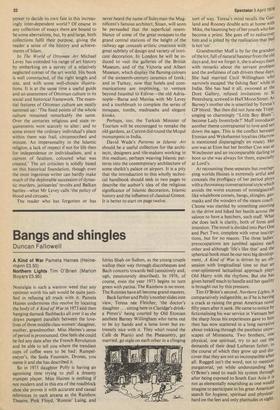Bangs and shingles
Duncan Fallowell
Northern Lights Tim O'Brien (Marion Boyars £5.95) Nostalgia is such a wanton weed that any optimist worth his salt would be quite justi- fied in refusing all truck with it. Pamela Haines undermines this resolve by locating the body of A Kind of War in 1973 and then hanging damask flashbacks all over it as she draws pungent parallels between the love- lives of three middle class women : daughter, mother, grandmother. Miss Haines's sense of period is pronounced. One feels she could be fed any date after the French Revolution and be able to tell you where the trendiest cups of coffee were to be had: Rumpel- meyer's, the Soda Fountain, Drones, you name it and she has described it.
So in 1973 daughter Polly is having an agonising time trying to pull a dreamy trumpet player. Miss Haines is nothing if not modern and in this era of the roadblock shoe she proves it with accurate and casual references to such arcana as the Rainbow Theatre, Pink Floyd, 'Ronnie' Laing, and [dries Shah on Sufism, as the young couple wallop their way through discotheques and Bach concerts towards bed (sensitively and, ugh, passionately described). In 1976, of course, even the year 1973 begins to turn green with patina. The Rainbow is no more. The Ronnies have all become grand masters.
Back further and Polly's mother slides into view, Teresa née Fletcher, 'the doctor's daughter ... sitting here in Claridge's drink- a Pimm's' being courted by Old Etonian aesthete Barney Willingham who turns out to be icy hands and a lame lover but ex- tremely nice with it. They whirl round the Café de P(aris) and the Pheasantry, get married, go stale on each other in a clinging sort of way. Teresa's mind recalls the Gar- land and Rooney double acts at home with Mike, the haunting boy of her youth who has become a priest. She goes off to rediscover him and is jolted by the realisation that bed is not 'on'.
Grandmother Muff is by far the grandest of the lot, full of natural hauteur from the old days and, lest we forget it, she is always there with remarks about the servant problem and the awfulness of cab drivers these days. She had married Cecil Willingham who narrowly escaped 'the fishing fleet' while in India. She has had it all, swooned at the Dore Gallery, refused invitations to St Petersburg, screwed in Half Moon Street. As Barney's mother she is unsettled by Teresa's GP blood. 'But then did not June née Tripp, singing so charmingly "Little Boy Blues' . become Lady Inverclyde?' Muff introduces another theme contrapuntal to love and sex down the ages. This is the conflict between Etonian and Wykehamist loyalties (Harrow is mentioned disparagingly en route). Her son was at Eton but her brother Con was at Winchester and an incomparable darling to boot so she was always for them, especially at Lord's.
At recounting these separate but overlap- ping worlds Haines is extremely artful and conceals the profligacy of her period ploys with a throwaway conversational style which avoids the worst excesses of nostalgiacraft like whalebone corsets, bangs, shingles, gas- masks and the wonders of the steam coach: Cleone was startled by something snorting in the drive and hiked her bustle across the saloon to have a butchers, such stuff. What she does lack is clarity, both of form and intention. The novel is divided into Part One and Part Two, complete with verse inscrip-. tions, but for no reason. The three ladies preoccupations are jumbled against each other and although 'life's like that' and the spherical book must be our next big develop- ment, A Kind of War is driven by an ob- session with longitudinal time so that an over-splintered latitudinal approach plays Old Harry with the rhythms. But she has given herself much to handle and her qualitY is brought out by this pressure.
Tim O'Brien's second, Northern Lights, is comparatively indigestible, as if he is having a crack at raising the great American novel fifty years after it sank. He came to notice by fictionalising his war service in Vietnam but the sharp focus his experiences gave to him then has now scattered in a long narrative about trekking through the pantheist snow- scapes of Minnesota. Two brothers, one physical, one spiritual, try to act out the demands of their dead Lutheran father, 11
1 the course of which they grow up and dis- cover that they are not so incompatible after all. Rugged isn't the word, not to mention purgatorial, yet while understanding Mr O'Brien's need to wash his system through after being exposed to South East Asia it Is not as elementally nourishing as one would imagine to participate in his great American search for hygiene, spiritual and physical hard on the feet and only platitudes in sight.


































 Previous page
Previous page